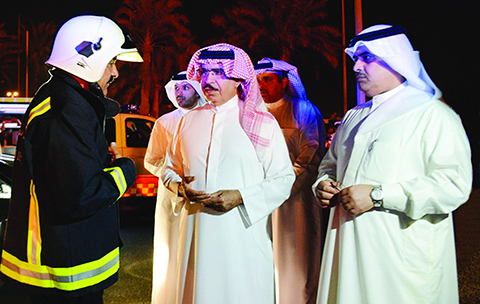 Bahraini Interior Minister Sheikh Rashid bin Abdullah Al-Khalifa talks with a member of the emergency services during his visit to the scene of an explosion yesterday. - AP
Bahraini Interior Minister Sheikh Rashid bin Abdullah Al-Khalifa talks with a member of the emergency services during his visit to the scene of an explosion yesterday. - APDUBAI: An explosion ripped through a pipeline belonging to Bahrain's state-run oil company and sent flames shooting up into the night sky, with government officials yesterday blaming the blast on an attack by militants guided by Iran. No one was injured in the explosion late Friday night near the Shiite village of Buri and no militant group immediately claimed the blast. However, it potentially opens a new front in the low-level insurgency plaguing Bahrain since its 2011 Arab Spring protests.
The explosion damaged cars and nearby buildings, forcing firefighters to evacuate those close to the flames in Buri, just outside of the capital, Manama. Authorities later extinguished the blaze on the pipeline belonging to the state-run Bahrain Petroleum Co, which closed the flow of oil to the stricken pipeline. Bahrain's interior minister, Sheikh Rashid bin Abdullah Al-Khalifa, said in a statement that the blast was "the latest example of a terrorist act performed by terrorists in direct contact with, and under instruction from, Iran". He did not say what caused the explosion, nor did he name any suspects.
Bahrain's Foreign Minister Khalid bin Ahmed Al-Khalifa later tweeted that the explosion had targeted a pipeline running between the island nation and neighboring Saudi Arabia, which provides financial and security support to the kingdom. This "is a dangerous Iranian escalation aimed at terrorizing citizens and damaging the world's oil industry," the minister tweeted. Iran had no immediate comment yesterday, though it long has denied being behind Bahrain's militant groups.
Bahrain produced some 64,000 barrels of crude oil a day in 2016, far lower than the other oil-producing nations of the Arabian Gulf, according to the US Energy Information Administration. It has faced increasing financial pressure in recent years. Bahrain relies on the Abu Safa oilfield for the majority of its oil. It shares the field with Saudi Arabia. Oil to Bahrain is transported via the 55 km A-B pipeline which has a capacity of 230,000 barrels per day (bpd).
A new 350,000-barrels per day oil pipeline between the two countries will be completed next year and will serve the planned expansion of Bahrain's refinery capacity. Arabian Light crude oil will flow from Saudi Aramco's Abqaiq plant via the 115-km new pipeline, 73 km of which will run overland and the rest under the Gulf.
Saudi Arabia's energy ministry said pumping to Bahrain had been suspended and the kingdom was stepping up security precautions at its own facilities. "The attack on the pipeline ... was followed by the suspension of the pumping of oil to the State of Bahrain," the Saudi Ministry of Energy, Industry and Mineral Resources said. "The Ministry of Energy also confirmed that it has increased its security precautions at all its facilities, and that all these facilities enjoy the highest levels of protection and safety," it added in a statement.
Bahrain, home to the US Navy's 5th Fleet, faces occasional attacks from local Shiite militant groups as the kingdom continues a crackdown on all dissent, imprisoning or forcing politicians and activists into exile. Independent news gathering there has grown more difficult, with the government refusing to accredit two AP reporters and others. However, that campaign of bombings and shootings had not seen the island's oil infrastructure targeted, even immediately after Emirati and Saudi forces helped Bahrain put down its 2011 Arab Spring protests.










